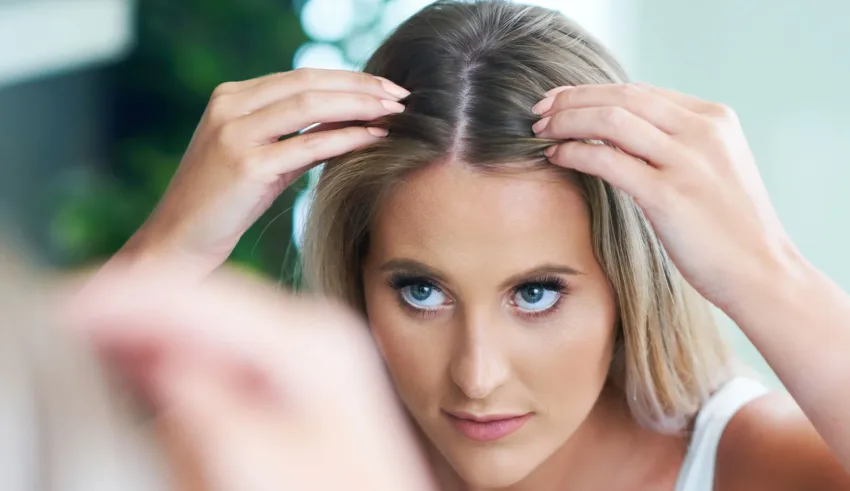
In today’s fast-paced career world, where ambition meets high demands, the impact on your overall health is no secret. What if I told you that the pressures of your job can have a lasting impact not only on your mental and physical well-being but also on your hair? From meeting room battles to the hairdresser’s chair, discover in this article from The Dermo Lab the complex link between job stress and hair loss, as well as strategies to help you cope with this tricky situation.
Executive tension: Job stress and hair loss
There’s a cost associated with the expression “having it all” for people navigating the demanding world of management. While having a corner office may bring prestige, it also comes with many responsibilities that may exacerbate hair loss. Constant decision-making, long working hours, and incessant expectations can lead to chronic stress, which triggers the infamous cortisol rush that disrupts the cycles of hair growth. High-ranking executives may find themselves unwittingly sacrificing not only their sleep but also their once-lush hair.
On the front line: Health professionals combat hair loss
Amid a global healthcare crisis, the tireless dedication of doctors, nurses, and other medical staff cannot be underestimated. However, the demanding nature of their work can manifest itself in unexpected ways, including hair loss. Prolonged hours in high-stress environments, combined with the emotional burden of life-or-death situations, can contribute to hair loss among healthcare professionals. The constant need to remain composed in the face of adversity can unintentionally damage hair health.
Entertainment industry: Spotlight stress and its effects on hair
Celebrity pressures are real, but they are frequently hidden behind a glamorous façade in the entertainment industry. Actors, musicians, and entertainers face the challenge of maintaining an image that is essential to their success while coping with rigorous schedules and public attention. The constant need to be camera-ready can lead to excessive styling, chemical treatments, and stress-related hair loss – a paradox where the quest for perfection can result in compromised hair health.
Titans of technology: The digital age and thinning hair
The technology sector is a representation of advancement and innovation in the digital age. Nevertheless, the psychological effects of a career in technology are authentic, even in a world where screens rule and algorithms are in charge. An extremely stressful environment can be created by long hours spent in front of screens, strict project deadlines, and the pressure to stay on the cutting edge of technological advancements. Tech executives might be unintentionally losing hair while shaping the future.
The labor of love: Physical labor and hair loss
From construction workers to athletes, people in physically demanding professions often face unique challenges when it comes to hair health. Intense physical activity and exposure to harsh outdoor conditions can contribute to hair loss by weakening hair shafts and follicles. The correlation between physical activity and hair loss emphasizes that although these occupations foster resilience in different aspects, hair health may suffer an unanticipated setback.
What can be done to reduce the impact of careers on hair health?
Mitigating the impact of careers on hair health requires a holistic approach that addresses both the physical and psychological factors contributing to hair loss. Here are some strategies to consider:
1- Stress management techniques: As chronic stress is one of the main factors in hair loss, incorporating stress-reduction techniques into your routine can make a big difference. Practices such as meditation, deep breathing exercises, yoga, and mindfulness can help lower cortisol levels and promote overall well-being.
2- Work-life balance: Establish clear boundaries between work and personal time. Give priority to self-care activities that allow you to relax, unwind and recharge. Take up hobbies, spend time with loved ones, and devote time to activities that bring you joy and relieve work-related stress.
3- Exercise regularly: Physical activity is not only good for your body but also for your mental health. Regular exercise helps to release endorphins, reduce stress, and improve blood circulation, all of which can contribute to healthy hair.
4- A healthy diet: A balanced diet, rich in essential nutrients such as vitamins (A, B, C, D, E), minerals (iron, zinc, selenium), and proteins, promotes hair growth and strength. Incorporate foods such as lean meats, fish, eggs, fruits, vegetables, nuts, and whole grains into your diet.
You can also take a dietary supplement that provides the hair bulb with essential nutrients (such as vitamins B6, B8, E, and iron). This strengthens hair and promotes high-quality growth.
Ducray Anacaps Food Supplements
5- Hydration: It’s essential to drink enough water throughout the day to maintain a healthy scalp and hydrated hair. Dehydrated hair can become brittle and prone to breakage.
6- Appropriate hair care: Use mild shampoos and conditioners suited to your hair type. Avoid excessive use of heated styling tools and chemical treatments, as these can weaken hair and contribute to hair loss. Watch out for tight hairstyles that can pull on hair follicles.
Anti-hair loss shampoos promote scalp health and maintain healthy hair growth. Here is our pick for the best anti-hair loss shampoo.
Ducray Anaphase + Anti-Hair Loss Complement Shampoo
7- Regular haircuts: Regular haircuts can help prevent split ends and breakage. Maintaining healthy ends is essential for overall hair health.
8- Sleep quality: Prioritize sufficient, restorative sleep. Sleep is essential for overall health and well-being, and plays a role in hair growth.
9- Professional advice: If you’re experiencing significant hair loss, consider consulting a dermatologist or healthcare professional specializing in hair health. They can give you personalized advice and recommend treatments or products tailored to your specific needs.
10- Thoughtful hairstyles: While some hairstyles may be fashionable or required by your profession, be wary of hairstyles that pull too much on the hair or cause stress to the scalp. Whenever possible, opt for softer hairstyles.
Conclusion:
The various ways in which careers intersect with hair loss highlight the need for a more holistic definition of success. The pursuit of excellence should embrace not only professional achievement but also the maintenance of physical and mental health. As we continue to face the demands of our choices, let’s not forget that our hair is more than just a superficial marker; it’s a reflection of the complex balance we find in our quest for a fulfilling life.










